You should grow basil with garden allies because companion planting creates a natural defense system that repels harmful pests like aphids and tomato hornworms while attracting beneficial insects. These strategic partnerships enhance basil’s essential oil production and flavor through aromatic compounds from plants like chamomile and chives. Your soil health improves as legumes fix nitrogen and basil’s roots aerate compacted earth, reducing your need for synthetic fertilizers. Discover which specific plant combinations will maximize your basil harvest.
What Is Companion Planting and How Does It Work?
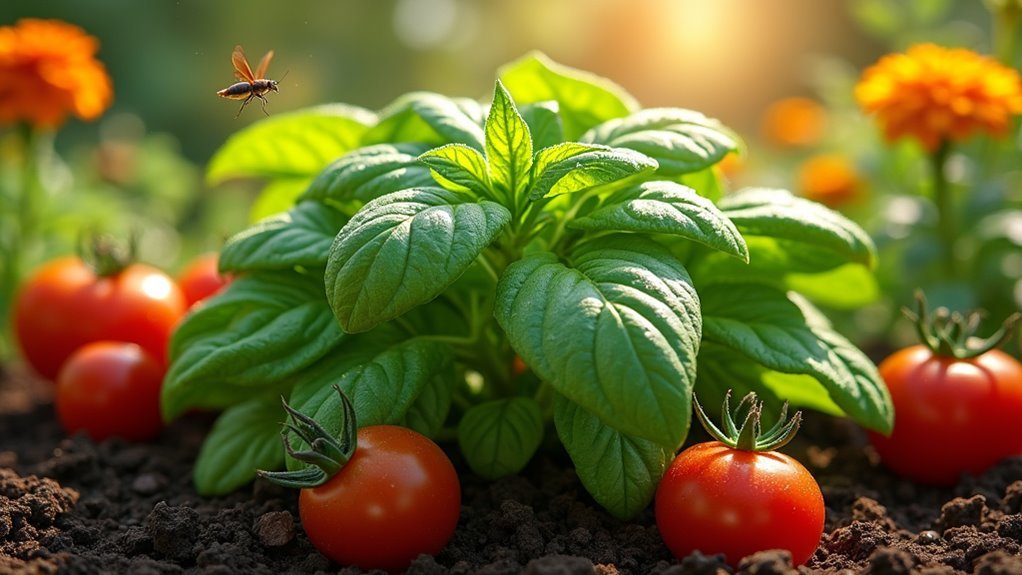
Companion planting pairs specific plants together in your garden to create mutually beneficial relationships that boost growth, ward off pests, and attract helpful insects. This strategic gardening technique works through natural chemical interactions between plants that enhance growth and improve flavor.
When you grow aromatic herbs like basil near tomatoes, they stimulate growth while helping repel pests through their strong scents.
The practice creates an effective natural pest management system where certain plants deter harmful insects while simultaneously attracting beneficial insects like pollinators and predators that control garden pests.
You’ll also maximize your garden space efficiently since compatible plants don’t compete for the same resources. Instead, some companions actually enrich soil nutrients, with legumes fixing nitrogen that neighboring crops can use for better development.
Natural Pest Deterrence Through Strategic Plant Partnerships
When you strategically pair basil with the right companion plants, you’re creating powerful aromatic barriers that naturally repel harmful pests while protecting your vulnerable crops.
Basil’s strong fragrance works alongside plants like marigolds and chives to mask the scents that typically attract destructive insects to your garden.
You’ll also attract beneficial predators like ladybugs that feast on aphids and other pests, creating a natural pest control system that works around the clock.
Aromatic Barrier Creation
Since basil’s potent fragrance naturally repels destructive insects like aphids and tomato hornworms, you can harness this aromatic power to create protective barriers throughout your garden. When you strategically position companion plants for basil like tomatoes and peppers, you’ll establish an aromatic barrier that shields vulnerable crops from garden pests.
| Aromatic Plants | Barrier Benefits |
|---|---|
| Basil & Chamomile | Enhanced essential oil production creates stronger deterrent effects |
| Basil & Chives | Combined fragrances confuse and repel multiple pest species |
| Basil & Marigolds | Dual aromatic compounds fortify garden defenses |
| Basil & Borage | Complementary scents improve overall pest management |
| Basil & Root Vegetables | Masked scents protect carrots and radishes from infestations |
These aromatic plants work together to enhance basil’s flavor while attracting beneficial insects that strengthen your garden’s natural defenses.
Beneficial Insect Attraction
Beyond creating protective barriers, basil’s aromatic properties actively draw beneficial insects that serve as your garden’s pest control team.
When you’re planting basil with companion plants like marigold and borage, you’ll attract ladybugs and hoverflies that naturally control pest populations. This basil companion planting strategy creates a synergistic environment where fragrant oils simultaneously repel pests while inviting pollinators that enhance growth throughout your garden.
You’ll find that pairing basil with chamomile boosts essential oil content, strengthening pest-repelling properties while drawing more beneficial insects.
Adding herbs like chives and dill to your basil partnerships promotes predatory insects that target common garden threats. These strategic plant combinations don’t just attract helpful species—they greatly enhance growth and yields while reducing pest infestations through natural predation.
Enhanced Flavor and Essential Oil Production in Basil
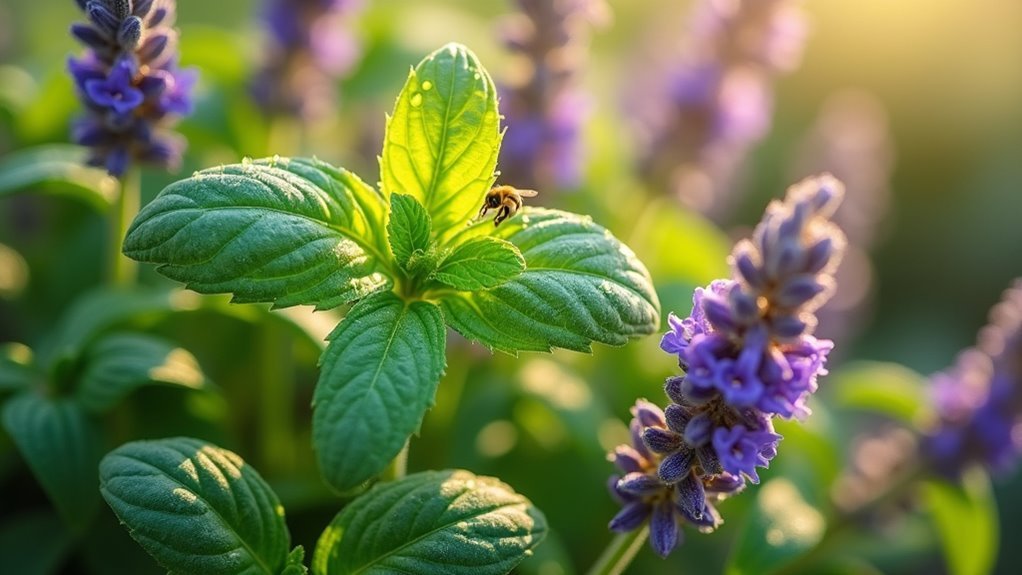
Although basil naturally produces aromatic essential oils, you can dramatically amplify both its flavor intensity and oil content through strategic companion planting.
When you grow basil alongside chamomile and chives, these companion plants markedly boost essential oil production, creating more flavorful leaves.
Plants to grow like borage and dill attract beneficial pollinators that improve the growth of your basil while increasing oil concentration.
Oregano serves as an excellent companion that’ll enhance the flavor by promoting beneficial soil microbes essential for basil’s development.
You’ll find that aromatic plants like garlic and parsley create ideal growing conditions that enrich basil’s flavor compounds.
Additionally, marigolds deter pests, allowing your basil to thrive without stress-induced damage that reduces essential oil production and compromises growth quality.
Soil Health and Nutrient Enhancement Benefits
While companion planting amplifies basil’s aromatic properties, it simultaneously transforms your garden’s soil health through powerful underground partnerships.
Basil’s roots naturally aerate compacted earth, creating ideal growing conditions for water infiltration and neighboring plant development. You’ll notice increased beneficial microorganisms activity around basil plantings, accelerating nutrient cycling throughout your garden ecosystem.
Strategic companion plants like legumes fix nitrogen directly into the soil, feeding both basil and surrounding crops with essential nutrients.
This symbiotic relationship enhances overall soil fertility while reducing your dependence on synthetic fertilizers. When you position basil alongside nutrient-demanding vegetables, you’re creating a balanced system that improves crop yields naturally.
The result is healthier plants, richer soil, and a more productive garden that sustains itself through these carefully orchestrated plant partnerships.
Best Garden Allies for Growing Healthy Basil
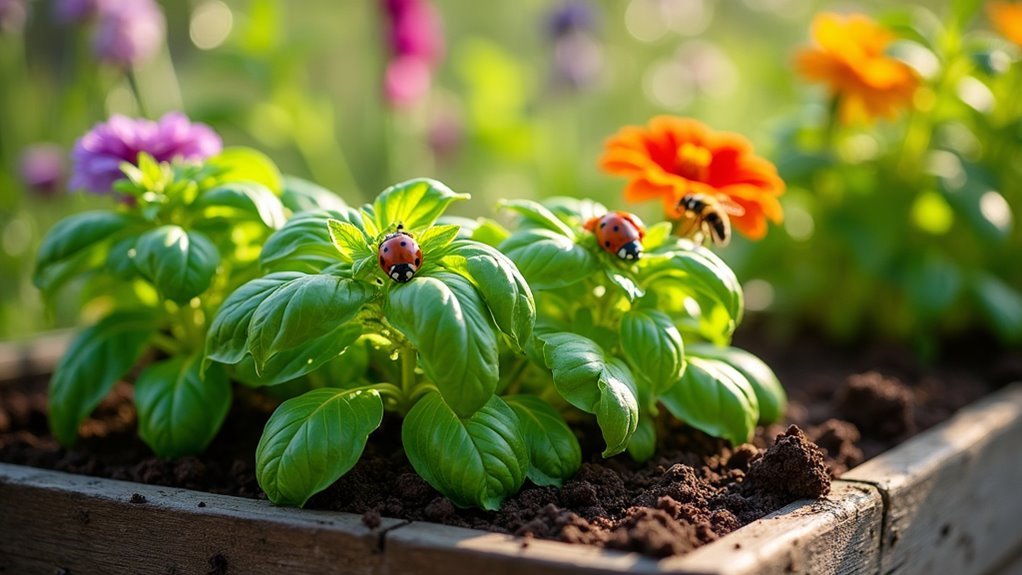
You’ll want to strategically choose companion plants that serve multiple purposes in your basil garden.
The best allies fall into three key categories: pest-fighting partners that naturally repel harmful insects, soil-enhancing vegetables that improve growing conditions, and flavor-boosting herbs that amplify basil’s essential oils.
Let’s explore each category to help you create the most beneficial plant partnerships for your basil.
Pest-Fighting Plant Partners
When you’re looking to protect your basil naturally, strategic companion planting creates a powerful defense system against common garden pests.
Basil companion plants like marigolds excel at pest control by repelling nematodes while attracting beneficial insects such as ladybugs and parasitic wasps.
You’ll discover that tomato plants and basil form an ideal partnership since basil’s aromatic properties repel destructive tomato hornworms.
Chives enhance flavor while simultaneously driving away aphids, helping your basil grow better with reduced pest pressure.
Asparagus creates another winning combination where basil’s scent deters asparagus beetles while attracting ladybugs for natural aphid control.
This thoughtful companion planting approach transforms your garden into a self-sustaining ecosystem where plants naturally protect each other.
Soil-Enhancing Vegetable Companions
Beyond pest control benefits, certain vegetable companions actively improve soil conditions that help your basil flourish in ways you mightn’t expect.
Companion planting strategically pairs herbs like basil with vegetables that enhance soil quality while maintaining natural pest control. Your vegetable garden becomes a thriving ecosystem where plants support each other’s growth and flavor development through beneficial soil interactions.
Here are three soil-enhancing companions that boost basil performance:
- Beets – Their deep taproots break up compacted soil, improving drainage and aeration around shallow basil roots while their aromatic partnership enhances flavor profiles.
- Asparagus – Establishes beneficial soil microorganisms that basil utilizes, while basil attracts beneficial insects that protect asparagus from harmful pests.
- Tomatoes – Share similar soil pH preferences and nutrient requirements, creating ideal growing conditions for both plants in your companion planting scheme.
Flavor-Boosting Herb Allies
Companion herbs create powerful flavor synergies that transform your basil from good to exceptional while providing natural garden protection. Strategic planting of chamomile alongside your basil boosts essential oil content, creating more intense flavor profiles while attracting beneficial insects. Chives serve as excellent companion plants, enhancing basil’s aromatic compounds and deterring harmful aphids that threaten herb garden health.
| Companion Herb | Flavor Benefits | Garden Protection |
|---|---|---|
| Chamomile | Boosts essential oils | Attracts pollinators |
| Chives | Enhances aromatics | Repels aphids |
| Borage | Improves taste quality | Deep root nutrients |
Borage’s deep root system creates underground nutrient exchanges that intensify basil’s flavor while improving overall plant vigor. This companion repels pests naturally, ensuring your herb garden thrives with minimal intervention.
Plants to Avoid When Growing Basil
While companion planting can boost basil’s growth, certain plants will hinder its development and should be kept at a distance.
Unlike excellent companions that enhance basil plants, these problematic neighbors create unfavorable conditions through their aromatic nature or specific growing requirements.
Here are three plants to avoid when planting basil near your garden beds:
- Cucumbers – Basil’s aromatic nature can alter cucumber flavor, making them taste unpleasant and bitter.
- Sage and Thyme – These herbs prefer dry, sandy soil conditions that conflict with basil’s need for consistent moisture and fertile growing medium.
- Rue and Fennel – Both release compounds into the soil that actively inhibits growth in neighboring basil plants, creating a hostile companion relationship that stunts development.
Frequently Asked Questions
What Are the Benefits of Basil as a Companion Plant?
You’ll benefit from basil’s natural pest repelling properties, improved soil texture, enhanced vegetable flavors, attraction of beneficial insects like ladybugs, and maximized garden space utilization for better overall yields.
What Plants Should Not Be Planted With Basil?
You shouldn’t plant cucumbers, sage, rue, fennel, or thyme with basil. These companions create unfavorable growing conditions, alter flavors, release growth-inhibiting compounds, or compete for different soil moisture requirements.
What Is the Benefit of Basil in the Garden?
You’ll benefit from basil’s natural pest-repelling properties, improved soil health, and enhanced flavors in neighboring plants. It’ll attract beneficial insects, increase biodiversity, and create a more sustainable, thriving garden ecosystem overall.
Why Do You Plant Basil Next to Tomatoes?
You’ll plant basil next to tomatoes because it repels harmful pests like tomato hornworms, enhances tomato flavor through aromatic oils, and creates ideal growing conditions since both plants thrive in similar environments.
In Summary
You’ll maximize your basil harvest by choosing the right garden allies. Companion planting isn’t just trendy gardening—it’s a proven strategy that’ll boost your basil’s flavor, protect it from pests, and improve your soil naturally. Don’t plant basil near incompatible species that’ll stunt its growth. Instead, select strategic partners that’ll create a thriving ecosystem in your garden. Your basil will reward you with more aromatic leaves and healthier plants.

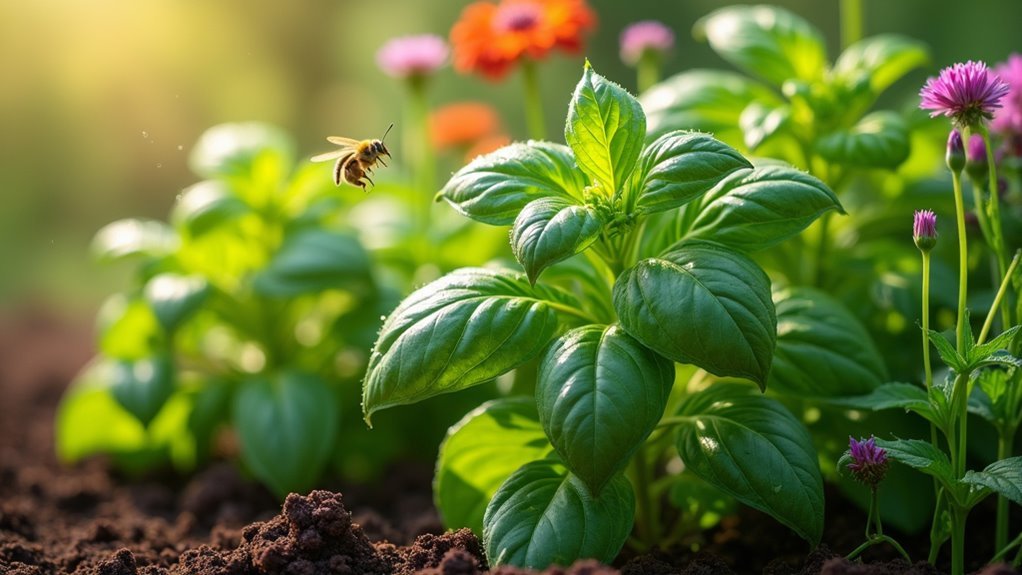


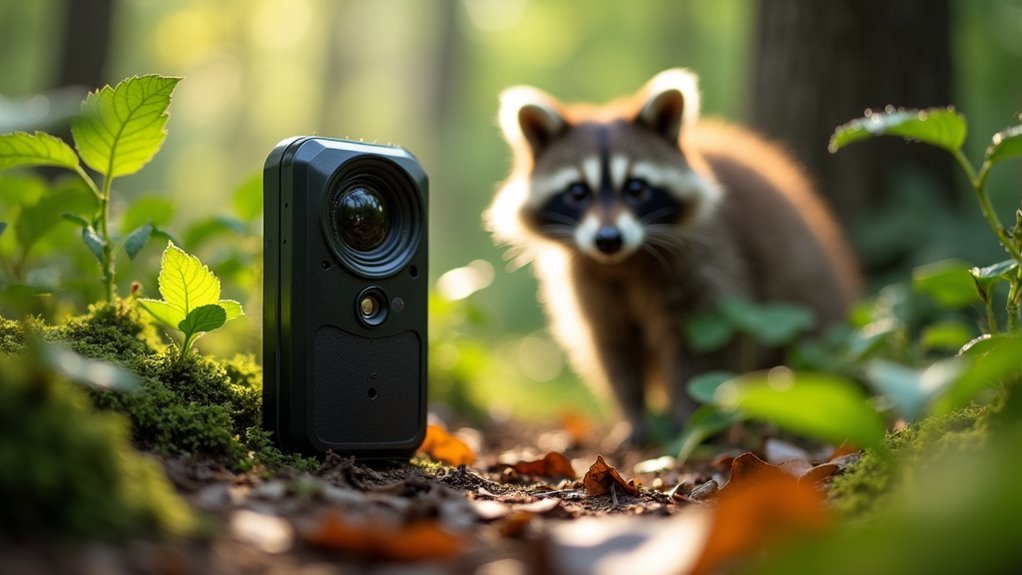
Leave a Reply